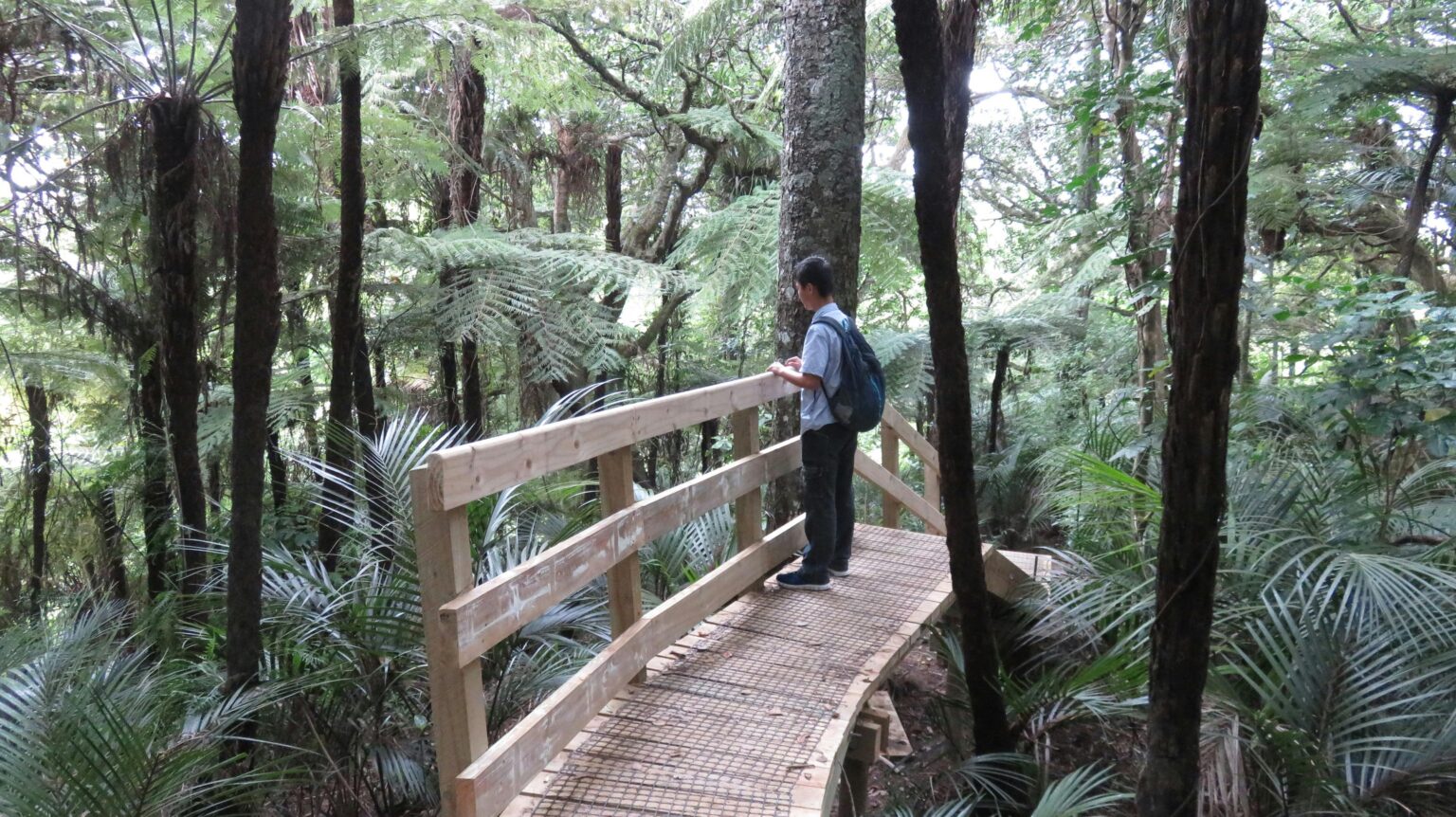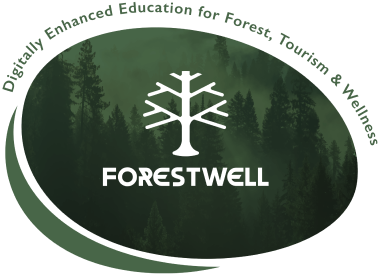
Topic Progress..
Overview of Topic 2.4 Regenerative ForestWell Approaches and Design focuses on minimising the ecological footprint of recreational, wellness, and nature-based activities within forest environments. This topic emphasises the importance of preserving valuable habitats while enhancing visitor experiences through sustainable infrastructure, businesses, and services. The core objective is to move beyond sustainability toward regenerative practices, which actively restore and revitalise ecosystems and communities. By incorporating regenerative thinking, ForestWell aims to maximise environmental, economic, and social benefits, ensuring long-term viability and positive impact.
ForestWell aims to minimise the ecological footprint of recreational, forest, wellness and nature based activities, to preserve valuable habitats and features while enhancing visitor experiences. Developing and maintaining infrastructure, businesses, and services that promote green development will help protect and promote a closer connection and deeper understanding of the natural world, encouraging sustainable behaviors among practitioners, businesses, and visitors.
ForestWell also needs to embrace regenerative approaches to ensure its long-term viability and positive impact. These approaches go beyond sustainability by actively restoring and revitalising natural ecosystems and communities. Understanding how to incorporate regenerative thinking into ForestWell’s framework is crucial for maximizing environmental, economic, and social benefits. Embracing regenerative tourism does not mean just minimising the negative impacts of recreation but actively enhancing and revitalising natural and cultural ecosystems. This can be done via thoughtful design, proper training, and sustainable construction practices, and approaches. Here are some examples of such regenerative ForestWell tourism approaches.
Regenerative Design is not just about sustaining what we have, but improving upon it and leaving a positive legacy for generations to come. While sustainable design is aimed at minimising negative impacts, regenerative design takes a more proactive approach by actively restoring and enhancing ecosystems and communities.
Regeneration is the ultimate form of sustainability, as it not only preserves but actively improves the vitality of ecosystems and communities.” — Anna Edey
“Regenerative design calls us to be stewards of the Earth, working in partnership with the land to enhance its health and vitality.” — Bill Reed
At the heart of regenerative design is the belief that we, as humans, can be catalysts for positive change. That we are capable of restoring the Earth’s systems rather than depleting them. (Source Designing a Regenerative Community)
Regenerative design invites us to reimagine our relationship with nature and design, recognizing that our well-being is intrinsically tied to the health of the planet.
Recommended Reading Regenerative Development and Design 2020
Environmental Restoration
Traditional sustainability practices focused on minimising harm, but regenerative approaches aim to restore and enhance ecosystems. For ForestWell, this means not only preserving existing forest environments but also actively working to regenerate degraded areas. Techniques such as reforestation, soil restoration, and biodiversity enhancement can help rejuvenate forest ecosystems, making them more resilient to climate change and other environmental pressures.
Forest restoration is critical for addressing Europe’s many environmental and social challenges. They also have an important role to play in Europe’s shift to sustainability. The health of Europe’s forests and linked ecosystems are facing an increasing number of challenges, including deforestation due to urban development, pollution and impacts of climate change, all of which threaten forest resilience. Maintaining and ensuring their long-term health will require more sustainable management practices and proactive efforts to address the impacts of climate change according to two European Environment Agency (EEA) briefings published today, on 21 March – International Day of Forests. (Source European Environment Agency)
Image by Space10
Community Engagement and Empowerment
Regenerative ForestWell tourism must emphasise the importance of local communities in the stewardship of natural resources and include them by using regenerative thinking. ForestWell regenerative thinking means integrating and focusing on nature, tourism, health and wellbeing in decision-making processes to ensure regenerative and sustainable development. ForestWell initiatives can provide education and organise activities to communities involving sustainable and regenerative ForestWell practices that will provide opportunities that benefit them economically, environmentally and socially. This can be done a number of easy but first involves everyone coming together and looking at the interconnectedness of ForestWell and communities, where the challenges lie and coming up with regenerative solutions using regenerative thinking. This ‘regenerative thinking’ engagement helps engage, educate, and build stronger, more resilient communities that are invested in the health of their natural surroundings leading to long-term sustainability and mutual benefits for both the community and the environment. Examples of how ForestWell initiatives can do this;
Check out how Out West Living develops regenerative slow tourism accommodation options such as cabins built to be ‘off grid’ where each site creates its own power and harvests its own rain water.
The role of forests for human health and well-being needs more research as there are so many benefits, the dose-effect relations and for improving forestbased care activities. For this, crosssectoral cooperation with public health professionals, urban developers, and other sectors is encouraged. Additionally, the growing interest in this field represents an opportunity for businesses with innovative approaches towards forest-based health interventions and green care activities to emerge.
Economic Vitality: By adopting regenerative approaches, ForestWell can create a more robust economic model. Regenerative tourism attracts eco-conscious travelers who are willing to pay a premium for experiences that align with their values. This can lead to increased revenue streams and job opportunities in rural and forested areas, providing economic development that is both inclusive and sustainable.
Regenerative planning for example; seeks to create environments and communiities that actively improve the environment. This includes green infrastructure, renewable energy integration, and sustainable transportation systems that reduce carbon footprints and enhances and protects environmental ecosystems where people want to live, invest and stay.
Regenerative businesses support each other by focusing on working together. They create products and services that contribute positively to the environment and society. They involve sustainable and circular economy principles, where waste is minimised, and materials are reused and recycled.
Health and Well-being: ForestWell’s focus on wellness can be greatly enhanced through regenerative practices. Regenerative approaches to tourism and land management can improve the overall health of forest ecosystems, which in turn enhances the physical and mental well-being of visitors. Cleaner air, vibrant biodiversity, and serene natural settings contribute to a more profound sense of relaxation and rejuvenation for guests.
Image Credit https://outwestliving.ie/about/
Recommended Reading:
Restore Sustainability, Restorative to Regenerative, 2021
EU Just Transition – Innovations in Regenerative Tourist Accommodation
Incorporating regenerative approaches into ForestWell’s operations is essential for creating a sustainable and impactful tourism model. By focusing on environmental restoration, community engagement, economic vitality, and health and well-being, ForestWell can ensure its activities contribute positively to the natural world and local communities. This commitment to regenerative thinking not only enhances the visitor experience but also supports broader goals of sustainability and ecological balance, positioning ForestWell as a leader in the field of regenerative tourism.
